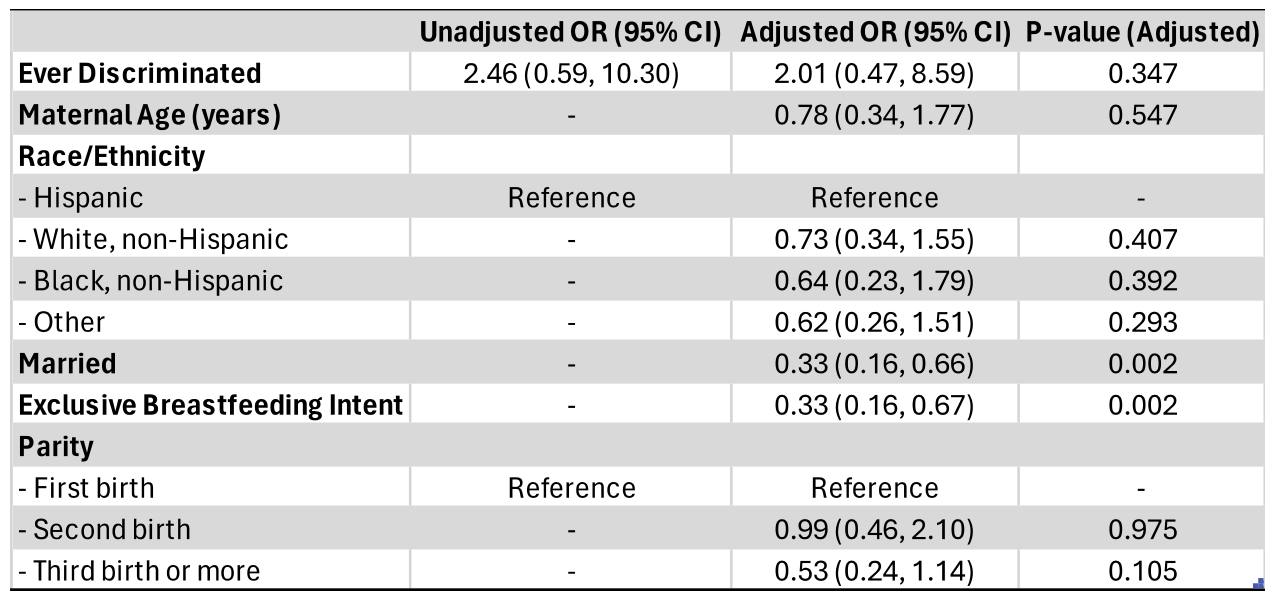Breastfeeding/Human Milk 1
Session: Breastfeeding/Human Milk 1
642 - Reported Unequal Treatment in California: Discrimination in Maternity Care and Breastfeeding Duration
Saturday, April 26, 2025
2:30pm - 4:45pm HST
Publication Number: 642.6519
Kulwinder K. Dhaliwal, Rutgers, Robert Wood Johnson Medical School, Manalapan, NJ, United States; Bhupinder S. Grewal, Atlantic Health System, Manalapan, NJ, United States; Adolfo Cuevas, New York University, New York, NY, United States

Kulwinder K. Dhaliwal, MD, MPH (she/her/hers)
Postdoctoral Fellow
Rutgers, Robert Wood Johnson Medical School
Manalapan, New Jersey, United States
Presenting Author(s)
Background: Perceived discrimination during maternity care may negatively impact breastfeeding practices among minority women.
Objective: To examine the association between perceived discrimination during maternity care and breastfeeding duration among mothers in California and explore the potential moderating role of race/ethnicity and mediating role of perceived discrimination in the relationship between race and breastfeeding duration.
Design/Methods: Using data from the Listening to Mothers in California survey (N=2,539), we conducted logistic regression analyses to assess the relationship between perceived discrimination and breastfeeding duration, adjusting for sociodemographic factors. We also examined race/ethnicity as a moderator and perceived discrimination as a mediator.
Results: Perceived discrimination during maternity care was not significantly associated with breastfeeding duration (adjusted OR=2.01, 95% CI: 0.47, 8.59, p=0.347). Race/ethnicity did not moderate this association (interaction term p=0.366). Marital status (p=0.002) and prenatal feeding intention (p=0.002) were significant predictors of breastfeeding duration. Perceived discrimination did not significantly mediate the relationship between race and breastfeeding duration, with non-significant direct effects for both Black vs. White (0.0466, 95% CI: -0.906, 0.999) and Hispanic vs. White comparisons (0.5771, 95% CI: -0.025, 1.179; indirect effects: Black vs. White: 0.0528; Hispanic vs. White: 0.0091). Confidence intervals for the indirect effects were not available due to limitations in the statistical output.
Conclusion(s): While perceived discrimination was not directly associated with breastfeeding duration, the study highlights the importance of marital status and prenatal feeding intention in shaping breastfeeding practices. Although discrimination did not play a role, other measures that capture the effects of racialization need to be examined further to better understand what explains the persistent disparities in breastfeeding behaviors.
Dhaliwal Offer Letter-6-24-2024 LK,KDsigned.pdf
Ordered Logistic Regression Model
 Association between perceived discrimination and breastfeeding duration, adjusted for sociodemographic factors, among women (N=2,539), Listening to Mothers Survey, 2018
Association between perceived discrimination and breastfeeding duration, adjusted for sociodemographic factors, among women (N=2,539), Listening to Mothers Survey, 2018
